Dental hygiene in Konstanz and Bietingen near Schaffhausen
Find out how we use the DR. HAGER | DHConcept©to clean your teeth particularly gently yet thoroughly, and how much professional teeth cleaning with us costs.
- State-of-the-art technology
- Particularly gentle and thorough tooth cleaning
- Family practice for 40 years, now in its 2nd generation
Why regular dental hygiene at the dentist is important
- For most people, regular dental care at home is an integral part of everyday life. Nevertheless, cleaning with a toothbrush can only remove up to 60 percent of harmful plaque. Even with careful oral hygiene, soft and hard plaque forms on the tooth surfaces, especially in hard-to-reach areas such as between the teeth. It doesn't matter whether you use a conventional or electric toothbrush.
- It is therefore particularly important to have your teeth professionally cleaned in a dental practice on a regular basis. During a professional dental cleaning at our dental practice in Konstanz or Bietingen, stubborn plaque is removed, even in hard-to-reach areas, using special agents to prevent bacteria from accumulating and multiplying.
- Another advantage: Professional teeth cleaning not only helps to prevent diseases of the teeth and the periodontium, but also removes slight discoloration of the teeth.
- Conclusion: Regular professional dental cleanings make an important contribution to keeping your teeth and gums healthy and aesthetically pleasing in the long term!
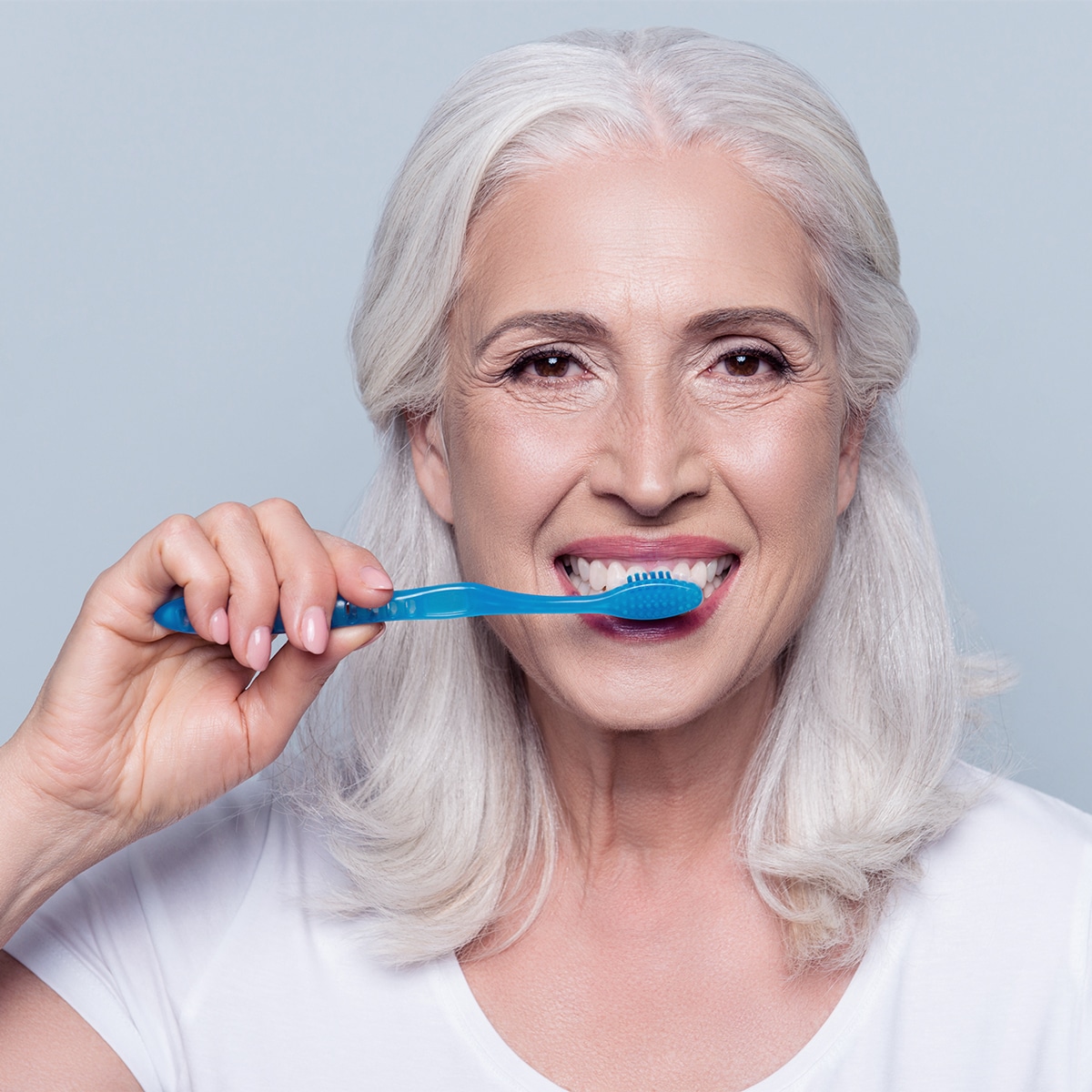

“The concept of Dr. Hager dental practices places dental hygiene at the heart of dental health. Professional dental cleaning forms the basis for lifelong vitality of teeth and gums. So we dental hygienists at DR. HAGER | Zahnärzte are pleased to be able to offer our patients a well-thought-out concept from A to Z.”
Irina
Advantages of dental hygiene
- Professional teeth cleaning provides effective protection against tooth decay and periodontitis. It reduces the risk of tooth decay by up to 90 percent, which means fewer fillings and less tooth loss. This means that you can keep your own teeth into old age.
- Once tartar and other deposits have been removed, dentists have a clear view. Check-ups can therefore be carried out quickly and precisely.
- Professional teeth cleaning also has a positive effect on dentures. Polishing ensures that crowns, bridges, implants and veneers last significantly longer.
- Dental hygiene will significantly reduce bad breath, as the bacteria responsible for unpleasant odors lose their basis for life. After a PZR, your breath feels fresh and you can get closer to others again.
- By removing discoloration caused by food and stimulants such as tea, red wine, beet or nicotine, the teeth regain a brighter shine.
- The risk of tooth loss during pregnancy is greatly reduced. Bleeding gums disappear and the development of bacterial gum inflammation and periodontitis is prevented.
- The enamel is strengthened, which protects the teeth from acids and reduces the sensitivity of the tooth necks.
- By effectively reducing harmful bacteria in the gum pockets, positive effects on other organs are achieved. According to scientific studies, the susceptibility to various diseases is reduced.
How does dental hygiene or professional tooth cleaning work at DR. HAGER?
During the 40 years of our practice’s existence, we have developed prevention programs for all age groups, which we are constantly improving in order to always be at the cutting edge of technology.
A dental hygiene session essentially comprises the following points:
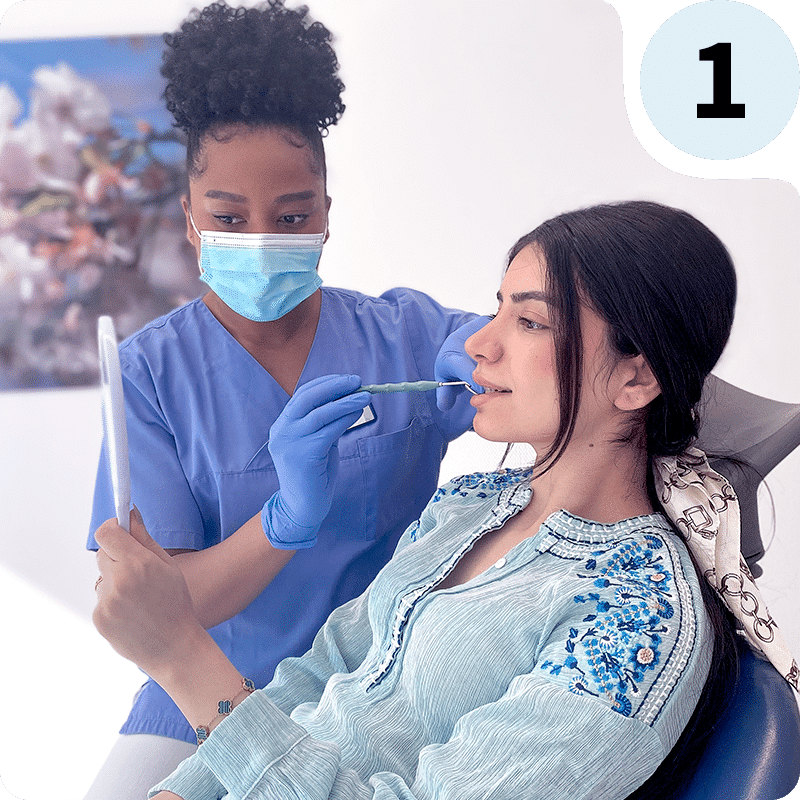
Examination of the dentition
A detailed examination of the teeth and oral cavity is carried out at the beginning of the session in order to identify any problems or diseases at an early stage and initiate appropriate measures. This includes checking for caries, gingivitis, plaque, tartar and other possible anomalies in the teeth.
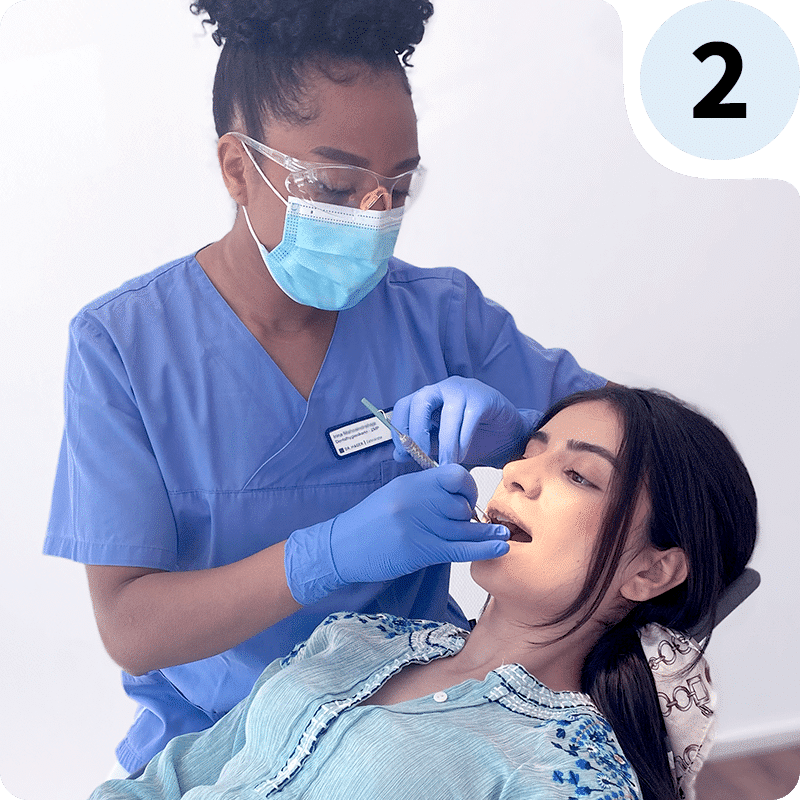
Gentle cleaning
Stubborn plaque on the tooth surfaces, in the interdental spaces and in the gum pockets is thoroughly removed during treatment using special instruments. In addition, stubborn discoloration is effectively removed using an Air Flow powder blasting device. This procedure enables gentle cleaning of the teeth and helps to maintain a radiant and healthy smile.
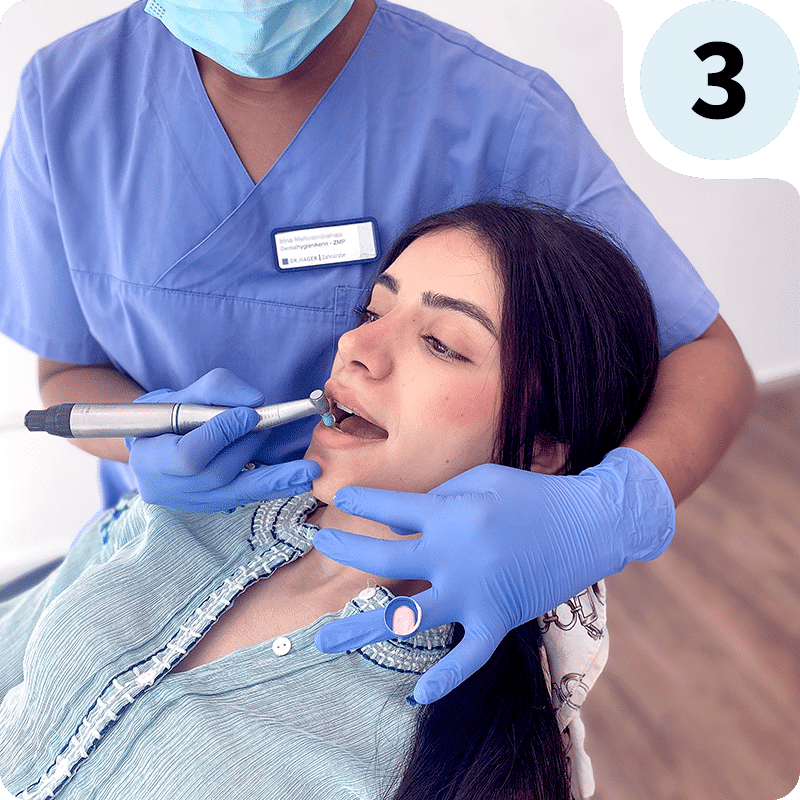
Teeth are polished for long-term dental health
After thorough cleaning and removal of plaque, the teeth are polished to smooth their surface. Polishing smooths out rough areas on the teeth, as bacteria prefer to adhere to uneven surfaces. A smooth tooth surface makes it more difficult for bacteria to multiply and therefore contributes to the long-term health of the teeth. Polishing not only ensures a pleasant mouthfeel, but also helps to prevent tooth decay and gum disease.
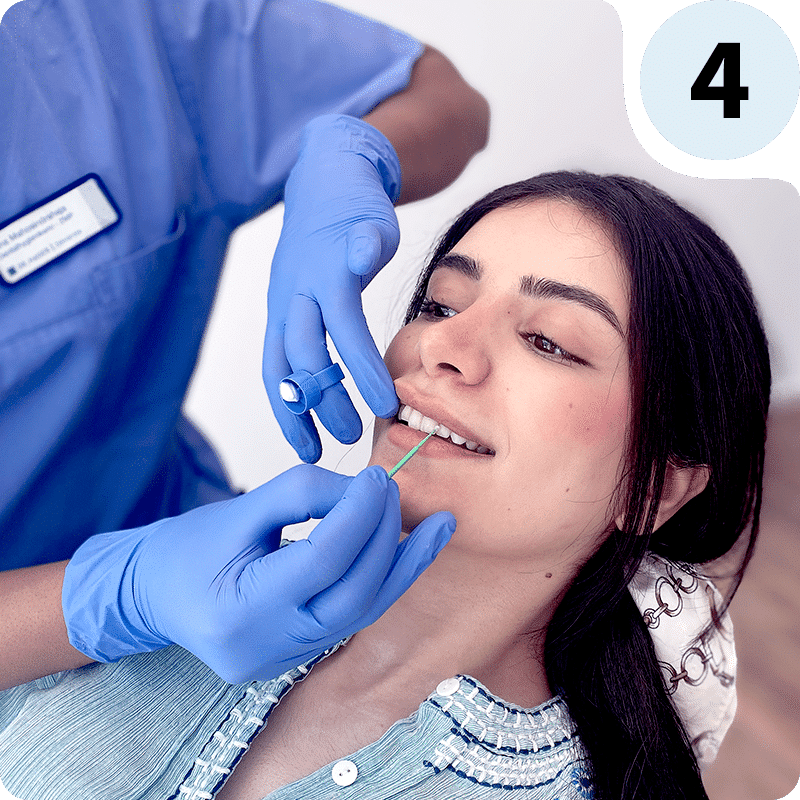
Application of fluoride varnish
After cleaning and polishing the teeth, a special fluoride varnish is applied to protect the enamel from acid attacks. Fluoride is an important component for keeping teeth healthy, as it promotes the mineralization of tooth enamel and thus protects against tooth decay. The fluoride varnish forms a protective layer on the teeth, making them more resistant to the effects of acids and thus reducing the risk of dental diseases. Regular use of fluoride varnishes can help to keep teeth healthy and ensure their long-term stability.
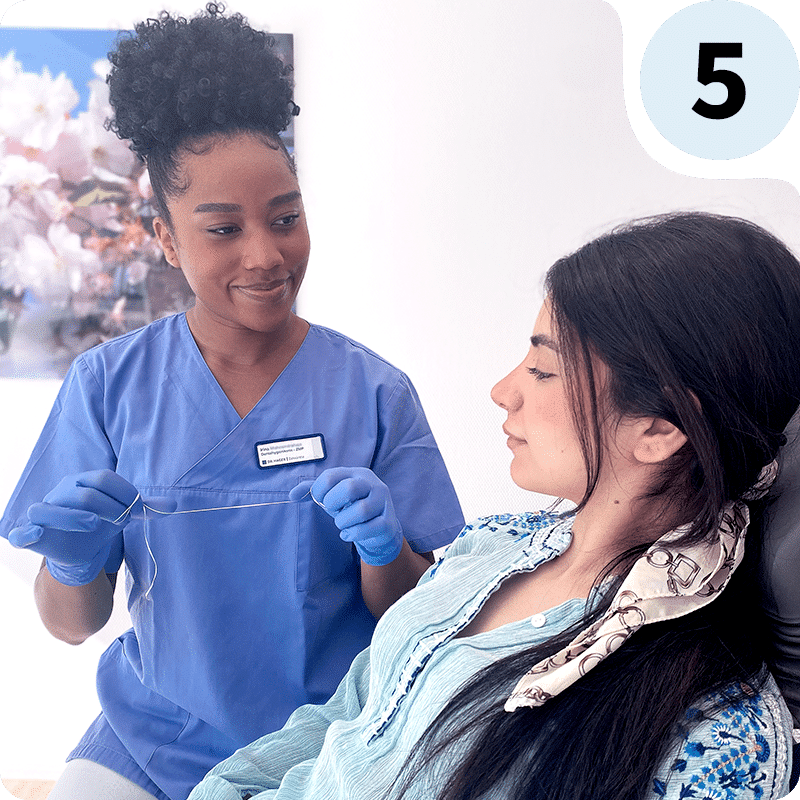
Instructions for daily oral hygiene and finishing
At the end of the treatment, you will receive sound instructions on daily oral hygiene to maintain the long-term health of your teeth and gums. Our specialists will show you how to brush your teeth properly, clean the spaces between your teeth and explain how to use dental floss or interdental brushes. You will also receive tips on the right diet for healthy teeth and how to deal with any oral health problems.
It is important that you follow these instructions and maintain your oral hygiene routine consistently to maintain the results of professional cleaning and minimize the risk of cavities, gum disease and other problems. Good oral hygiene is critical to overall health and well-being, so please take the time to incorporate the recommended steps into your daily routine. If you have any questions or uncertainties, please do not hesitate to contact us.
Find out more about our practice in our patient interviews
Testimonials from our patients
Bin sehr zufrieden mit dem Resultat.
Man wird kompetent beraten und das Ergebnis ist super
Gute Beratung und Empfehlung.
Gerne wieder.
Kann ich nur weiterempfehlen
Trotz viel Arbeit und sicher schon ein längerer Arbeitstag hat sie mich kompetent und sehr freundliche bedient.
Danke vielmals und schöne Festtage
Komme immer wieder gerne hier her.
Ich komme wieder Danke
Gerne wieder!
(Hätte mir einzig eine genauere Karieskontrolle gewünscht aber scheint alles im Ordnung zu sein)
Individual questions about dental hygiene
-
How much does dental hygiene cost at our dental practices in Konstanz and Bietingen?
Dental hygiene or professional teeth cleaning costs €139 at our dental practices in Konstanz and Bietingen. This is a fixed price offer. -
How long does a dental hygiene session last?
A dental cleaning session usually lasts 40 to 60 minutes, depending on the condition of your teeth and any symptoms. -
How often should I go to the dental hygienist?
In general, at least Dental hygiene should be carried out at least twice a year. However, the interval depends to a large extent on the patient's cooperation and tactility. On average, patients come for dental hygiene 3 times a year.
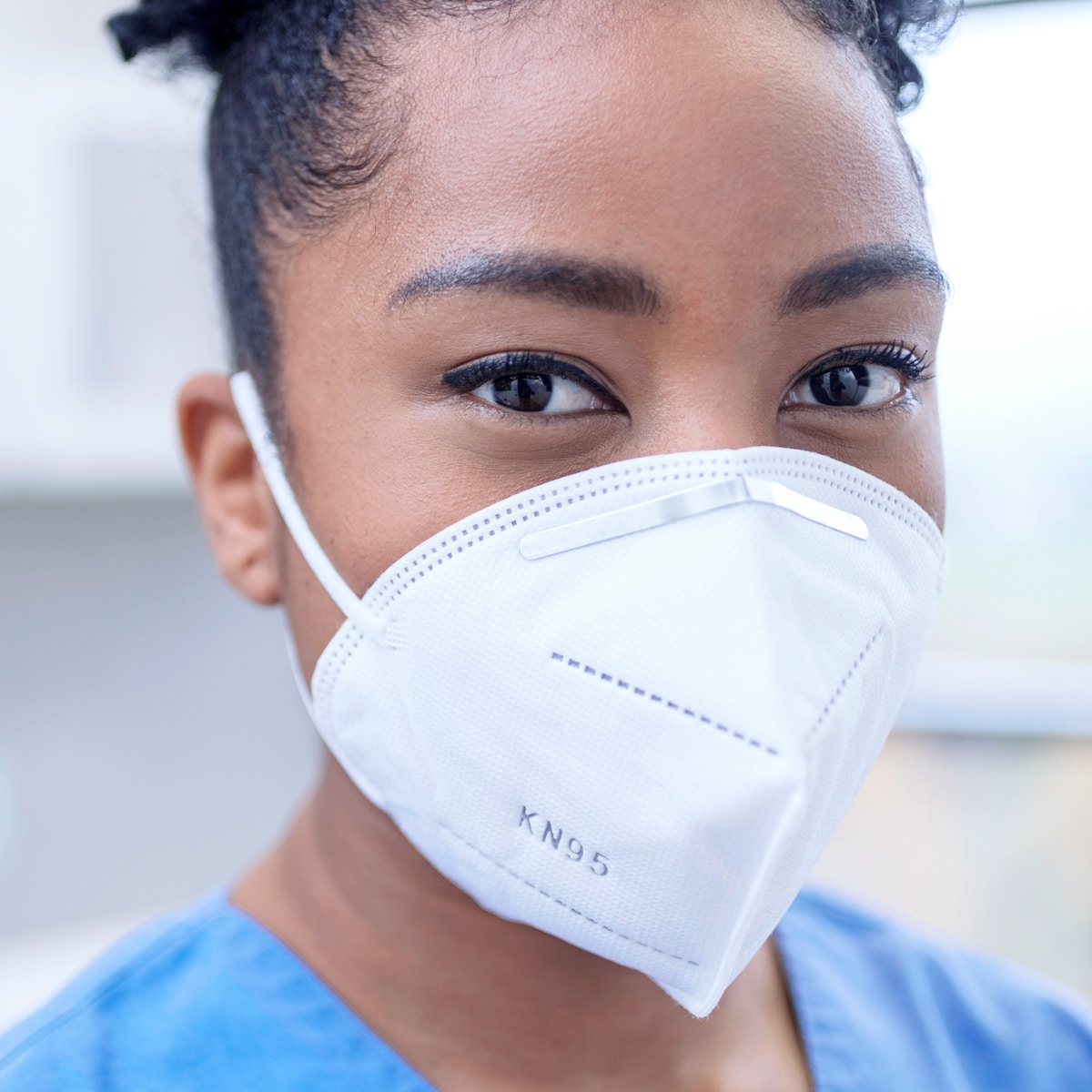
Gentle dental hygiene with DR. HAGER
Are you looking for an experienced dental practice near the Swiss border for your check-up and teeth cleaning? Then visit us!
When it comes to dental hygiene, we rely on a modern dental procedure that is as gentle and painless as possible.
The cause of dental diseases
Caries and periodontitis are by far the most common dental diseases worldwide. The cause is always and only the bacterial plaque that settles on the tooth. If these can be removed and kept away permanently, teeth will not become diseased!
Due to their natural shape, teeth are not so easy to clean. There are many nooks and crannies that are difficult to reach with a toothbrush or dental floss.
It is therefore not always possible to achieve optimal dental hygiene using conventional means. For this reason, we offer our patients an additional professional dental cleaning as part of the dental hygiene session. This involves intensive cleaning of your teeth, supported by the latest technology, which goes far beyond what you can achieve with your dental care at home.
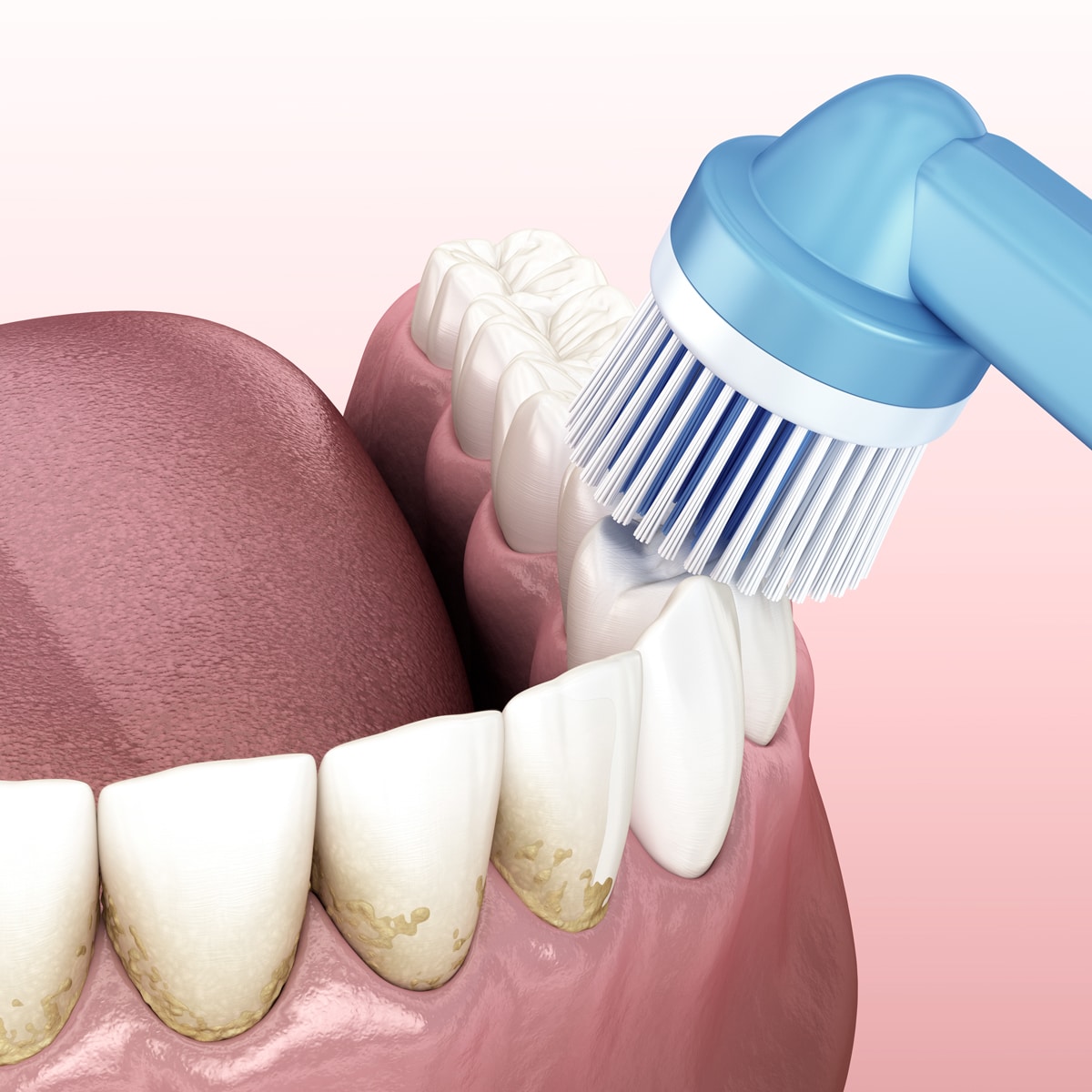
We recommend using ultrasonic toothbrushes and daily interdental brushes for optimal dental care.
Poor dental care leads to the accumulation of plaque and tartar, which increases the risk of tooth decay and periodontitis.
Swollen or bleeding gums are a good indication of dental disease and should be examined by a dentist
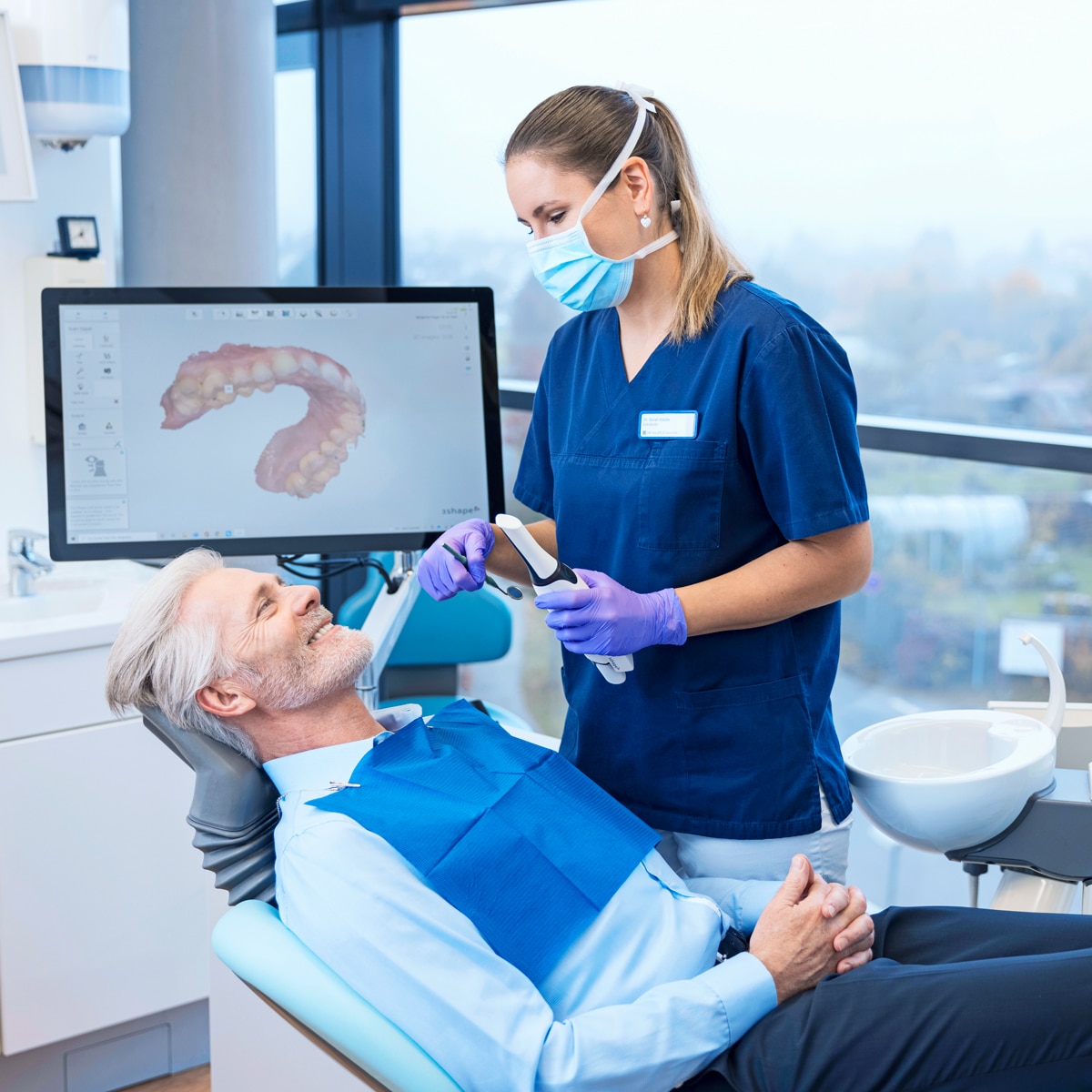
Permanently eliminate bad breath through dental hygiene
Bad breath (halitosis) is still a taboo subject. We are embarrassed to talk about it. As a result, we are unfortunately rarely approached by others about this flaw. However, in Germany at least 20% of the population suffers from bad breath, but only very few people know about it.
For those affected, this can mean a significant deterioration in their quality of life as well as an impairment in their job and social life. Contrary to popular belief, the cause of bad breath does not lie in the gastrointestinal tract, but in 90% of cases in the oral cavity.
Treatment of bad breath
If you are diagnosed with halitosis during an examination, we can offer you special individual therapy.
First, a special professional tooth cleaning is carried out to remove bacteria from the gum pockets and the spaces between the teeth. Then the entire tongue is cleaned up to the root of the tongue with a special brush.
In addition, antibacterial preparations (e.g. chlorhexidine) are used to remove bacteria that could not be eliminated by manual cleaning. To permanently eliminate bad breath, the underlying causes must first be identified, for which we use a detailed questionnaire. On this basis, a therapy concept can then be proposed for the final cure.
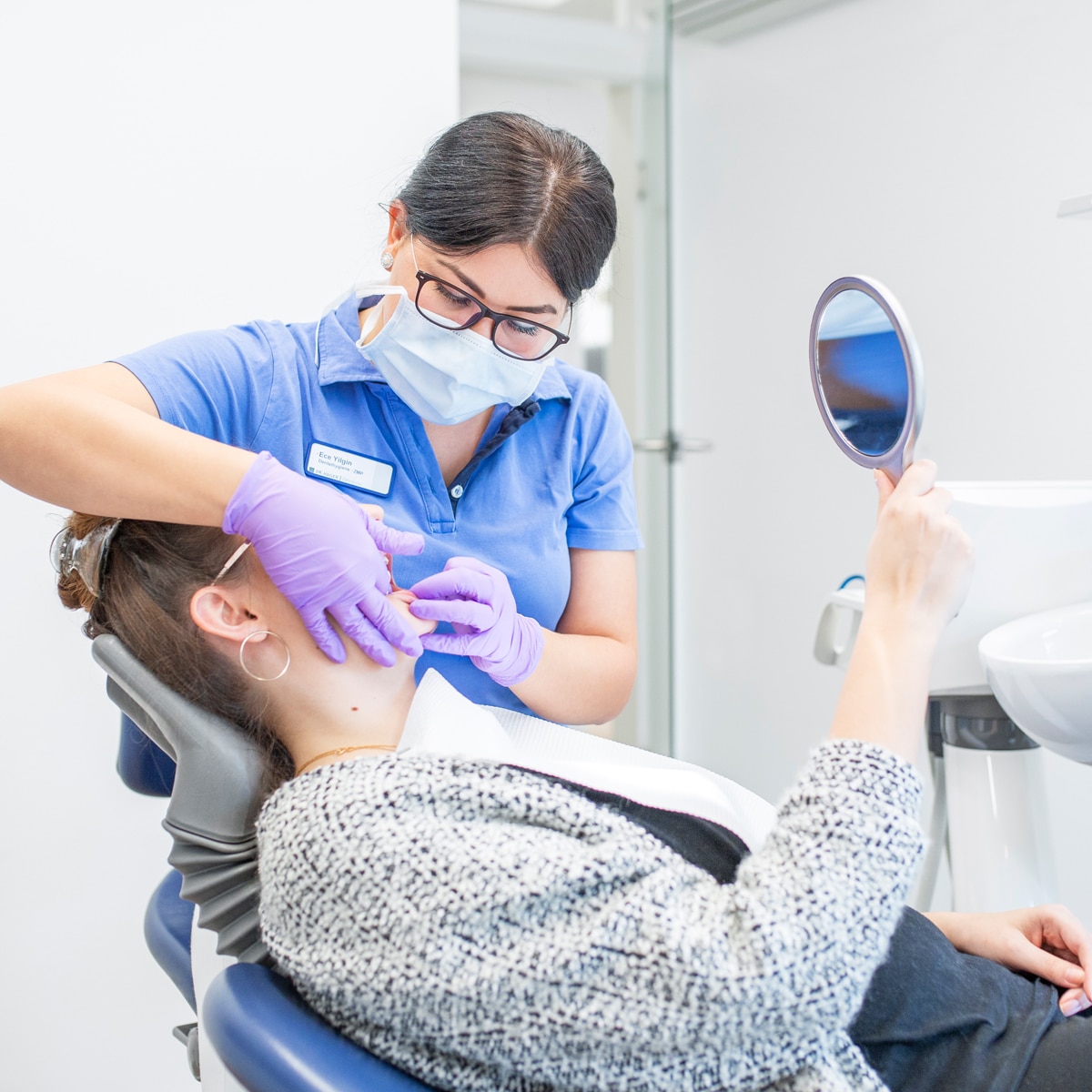
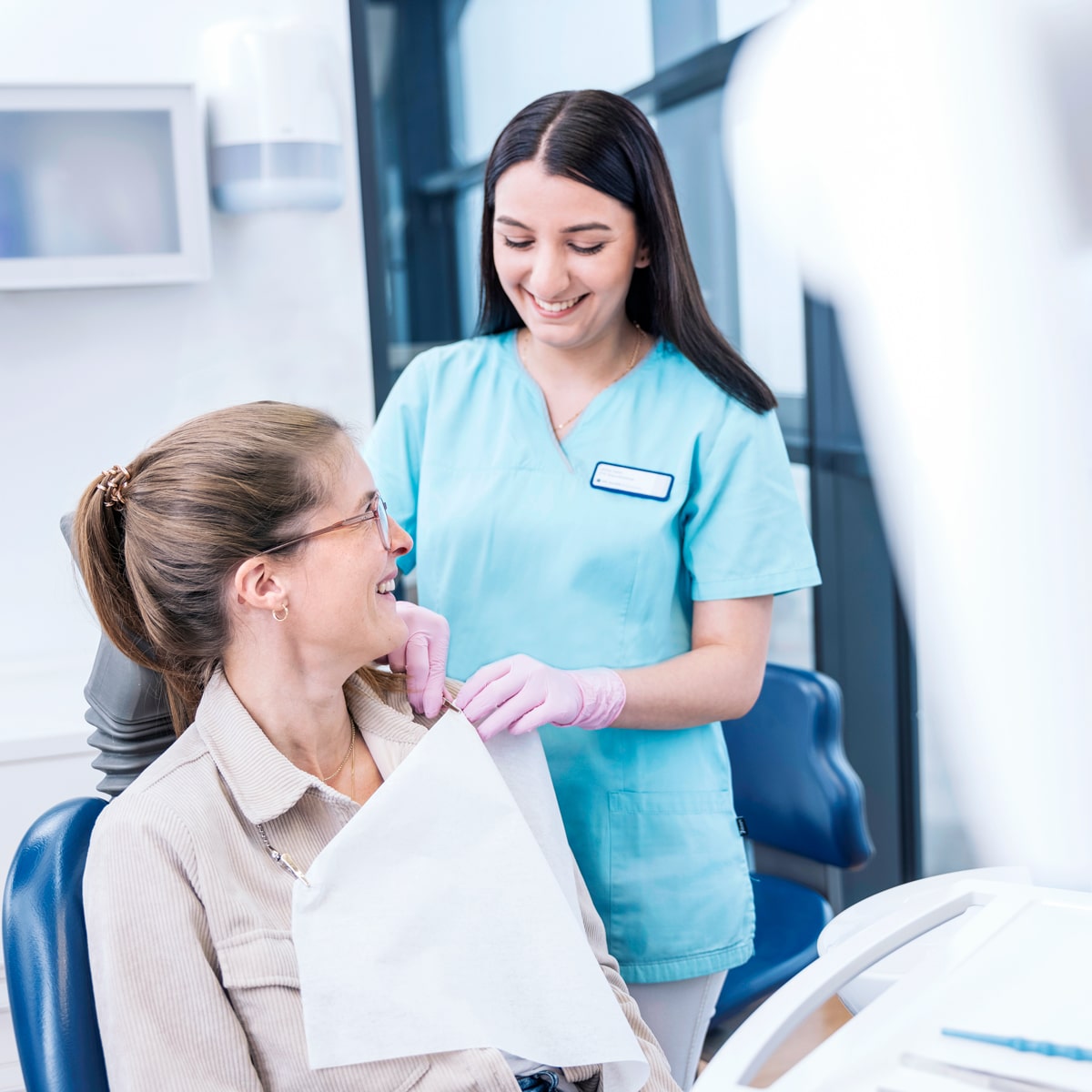
The lasting success of treatment
Regular check-ups and professional dental hygiene sessions, as well as the daily use of our cleaning set (tongue cleaner, antibacterial toothpaste and other utensils) are usually sufficient to ensure the long-term success of the treatment. You will be rewarded with fresh, healthy breath and increased self-confidence and can enjoy a whole new attitude to life.
Possible causes of bad breath can be: Bacteria on the tongue, in the interdental spaces, in the gum pockets, deposits on the tooth surfaces, dry mouth, infections or abscesses in the oral cavity, dry mucous membranes, snoring, smoking, fasting, diet or stress.
We look forward to seeing you!

and the entire Dr Hager team
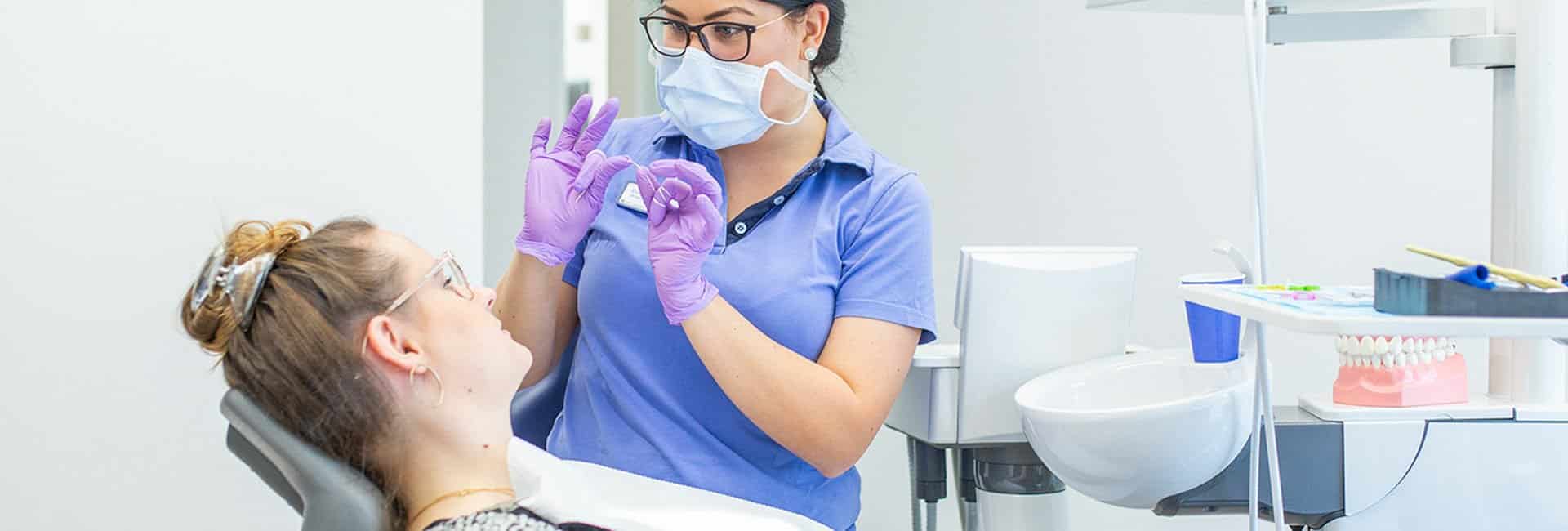
Frequently asked questions about dental hygiene
How much does dental hygiene cost?
Dental hygiene costs 139€ with us.
What is the Bass toothbrushing method?
Use the so-called bass method or bass technique to clean your teeth thoroughly and systematically. Place the toothbrush at a 45° angle to the gums and teeth, pressing the bristles lightly against the teeth and gums. Make at least 10 small, shaking or circular back and forth movements per tooth. This removes food debris from the tooth surface and from between the teeth. Then brush with a kind of wiping motion from the gums to the chewing surface and continue with the neighboring teeth. Clean your teeth systematically: first the outer surface, then the inner surface and finally the chewing surfaces.
How do I use dental floss correctly?
Take a 40-50 cm long piece of dental floss. Wrap it around both middle fingers a few times and support it with your thumb and index finger. Now use both index fingers to guide the dental floss into the interdental spaces. “Hug” the tooth and move the dental floss up and down. Guide the dental floss around the neighboring tooth in the same interdental space to ensure that both tooth surfaces are cleaned. The floss should be fluoridated. Choose unwaxed dental floss, as it is slightly fluffier and therefore has a better cleaning effect.
How do I use interdental brushes?
Interdental brushes are an alternative to dental floss for large interdental spaces. You should clean in front of a mirror. Slide the brush head into the interdental spaces and move it back and forth. You can rotate the brush slightly if you have a wide interdental space. Change the brushes every two weeks.
How long does a dental hygiene session last?
A dental cleaning usually takes 40 to 60 minutes, depending on the condition of the teeth and any complaints.
What is a tongue cleaner good for?
The tongue cleaner is ideal for removing tongue coating, which reduces the concentration of bacteria. It reduces bad breath and improves the sensation of taste.
Application: In the morning and evening, pre-clean the tongue with the brushes, applying light pressure from back to front. Turn the tongue cleaner over and remove the loosened plaque with the scraper. Repeat the process if necessary. Replace the tongue cleaner every two months.
Should I use fluoride gel?
Yes, because the fluoride remineralizes the tooth enamel, prevents tooth decay and treats sensitive tooth necks. Spread the fluoride gel on the tooth surface once a week before going to bed using a cotton bud or finger. Leave it on for two minutes and then spit it out again.
Are there any recommendations for buying a toothbrush and toothpaste?
The toothbrush should have a short brush head with soft, rounded bristles. Toothpaste should ideally also contain fluoride, as it protects against tooth decay. Avoid whitening toothpaste, as such products cause high tooth abrasion and can damage the teeth.